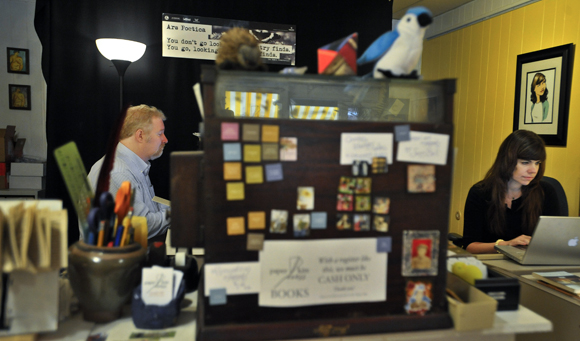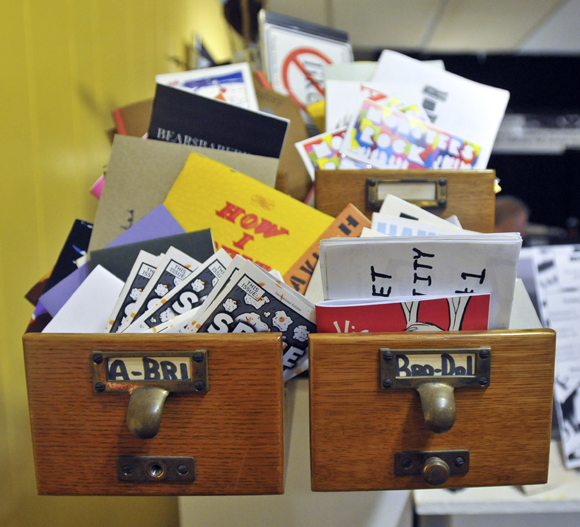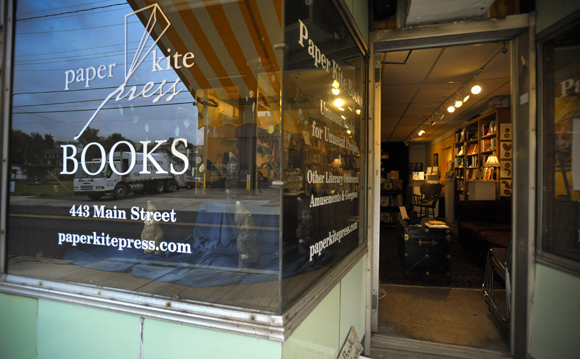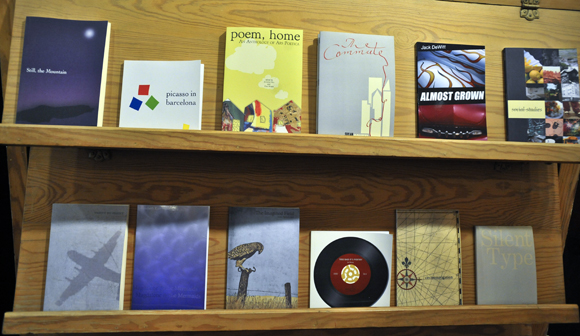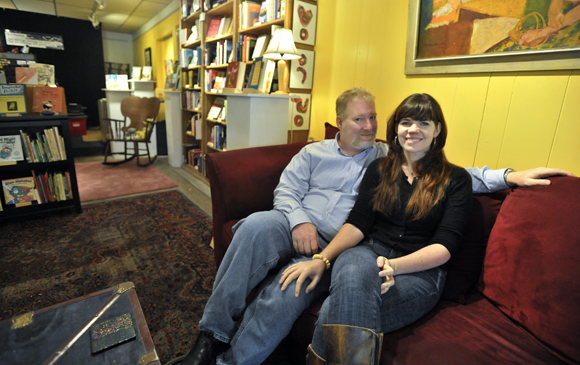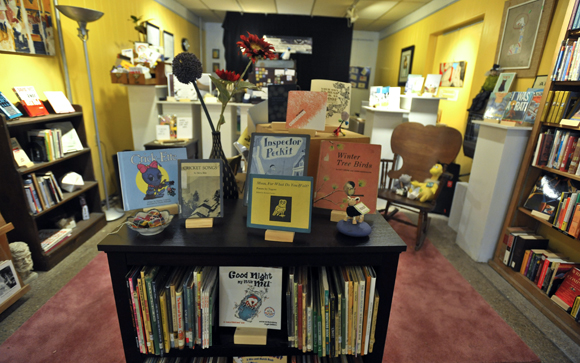The waning days of the big box chain bookstores and the rise of electronic reading devices could mean a lot of opportunity for Pennsylvania's small and independent presses. These publishers, distributors, and booksellers are finding new and creative ways to use technology as a way to promote their authors and connect with new readers.
Compared to the major publishing houses who sign the biggest literary names and run thousands of copies of books, small presses are, well, smaller — fewer authors, smaller print runs (about 100 copies or so), and perhaps a handful of titles under a press' imprint. Most of these publishers are in business for one of two reasons — a love of books as objects, and a desire to showcase undiscovered talent who are producing experimental works that may be a little too cutting-edge for the mainstream. The trick is to find a way to turn these projects into revenue.
Ron Mohring of Seven Kitchens Press, a micropress of poetry and fiction chapbooks in Lewisburg, assembles each book by hand, one at a time. Each volume is assembled, trimmed, tied, and numbered by hand, which takes quite a long time. Plan B Press in Reading, Berks County, has released 3 new collections of poetry in 2011 and holds educational programs and workshops throughout the region.
For Daniel McCloskey and Cyberpunk Apocalypse in Pittsburgh, a self-described “writers' collaborative,” their 'zine is just another way to get their members' work to the masses. McCloskey started the co-op in September 2009.
Building A Sense of Place
“I had been doing a lot of thinking about artists' spaces, and I visited this place in called Pirates' Cove in Allentown — a music spot where people would just stop by and perform. It was a simple setup — people who care about the same thing in the same spot help others who are traveling through the area. So I tried to think of how to apply this concept to writing.”
McCloskey, his sister, and a few other writers set up shop in a house in Upper Lawrenceville and they've had a revolving door of tenants ever since. “We usually have 5 to 6 people in the house at once,” McCloskey says. Space is available for both writers and non-writers, although the rent is slightly higher for non-writers. Besides their publication, the Cyberpunk members hold and participate in readings, writing workshops, lectures, open mic nights, and other events that promote their the work of their members and other emerging writers. The group also hosts a Visiting Writer Program.
“We reserve one of our rooms for a writer who is visiting from out of town. We have had approximately 20 visiting writers from US and Canada, and are booked through July 2012,” McCloskey says. “It has helped the house a lot. Having someone who is completely focused on writing and having someone new adds new energy to our own work.”
McCloskey says that the exploding digital literary landscape offers plenty of opportunity for writers, and he's starting to explore some of these delivery methods more seriously.
“One thing we do is make it (the publication) available free online, or available as a handmade copy,” he says. “We're just starting to get stuff together with Kindle now that Amazon is giving people a better deal. It's interesting and exciting that it's an even cheaper way to print. Whenever something gets cheaper something interesting happens. Technology has also made it easier for people to find us.”
Poetry in Motion
The poetry community has long relied on small presses to release their work. Jennifer Hill and Dan Waber of Paper Kite Press in Kingston, a small press focusing on poetry chapbooks, took this a step further and used a storefront they owned as a performance space for their fellow artists, but when the event schedule in the gallery started to take up most of their time, their focus shifted.
“Our focus was less on the Press. We wanted to spend more time in the books,” Hill says. They both felt it was time for a change, and converted their storefront into a, well, store. Their inventory consists of titles by their Paper Kite Press poets (they currently have 17 titles available), hard-to-find and unique used books, and titles by other small presses.
Waber says that he doesn't think the e-readers will provide much competition for the types of books they sell and the kinds of customers they attract. “Computers and technology are good for small presses,” Waber adds. “These e-readers are changing everything, and small publishers will either adapt or not. It's hard to say how it will affect the industry.”
It would be difficult to convert some poetry to an electronic device, and doing so would likely take some of the specialness away from the words, as poetry is meant to be visual. But, Waber says, small publishers should embrace the changes and find new ways to make them work for their authors.
Across the state, Open Thread, a Pittsburgh-based organization that supports the work of emerging writers, artists, and performers, has staged a Small Press Festival (SPF), a showcase for the works of indie authors and publishers in all genres, in the city for the past three years. The city's literary community has gotten behind the event in a major way, according to Scott Andrew, Open Thread Artistic Director.
“It was a month-long event for the past 2 years,” he said. “We had the expo and also library tours, meetings and gatherings that all tied into the small presses.”
Open Thread's staff is comprised of graduate students attending schools throughout the county, so for 2011, they teamed up with the VIA Music and New Media Festival (an annual event that promotes emerging artists and multimedia projects), shared an event space, and organized a downsized 1-day event that still drew more than 200 people.
Open Thread also releases an annual publication that features work by writers in Pennsylvania, Ohio, and West Virginia. Andrew said that it hasn't been released online yet, mainly because their website isn't equipped with an online payment option “and we do want to have some income from the projects,” but are exploring the best ways to do this. He has had some experience with translating books to digital text, and says it's a pretty archaic process.
“I'm working on a magazine project now where I'm digitizing it to get it ready for Kindle. It's just not true to the formatting of poetry, and I think it cuts out a little bit of the soul. I think that a lot of people like the aesthetic of a hand-made book. Also with bookmaking, there is full control as an editor or designer. That's one huge difference between traditional publishing and Kindle.”
Like Waber, Andrew says that it's difficult to maintain the spirit of some of the work on an electronic reader.
“The biggest thing is that it's hard to control the digital information and make it true to what the artist wanted,” he says. “Right now with the magazine project, I'm banging my head against the wall making line breaks. But everybody is looking at it as a way to have a digital presence, and that makes sense to me because it expands your readership.”
Andrew adds that it's been interesting to watch the effects of the publishing shift on younger people. His students at Lincoln Park Performing Arts Charter School in Pittsburgh are fascinated with bookmaking to the extent that the school added a course in bookmaking to their curriculum.
“I think that speaks a lot to what's going on,” he says. “They are so much more in the mindset of technology and the digital world, it's great that there's still an interest in the manipulation of the physical medium.”
SARA HODON is a freelance writer who lives, works, and plays in Northeast PA. Learn more about her writing trials and triumphs on her blog. Send feedback here.
PHOTOS:
Dan Waber, Editor and Jennifer Hill Editor and Book Designer own Paper Kite Press in Kingston
Various zines available at Paper Kite Press.
Outside Paper Kite Press
Books released by Paper Kite Press.
Editor Dan Waber with Editor/Book Designer Jennifer Hill
Inside Paper Kite Press
All photographs by AIMEE DILGER
